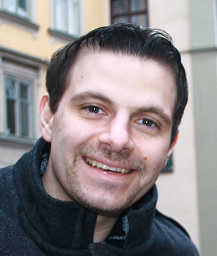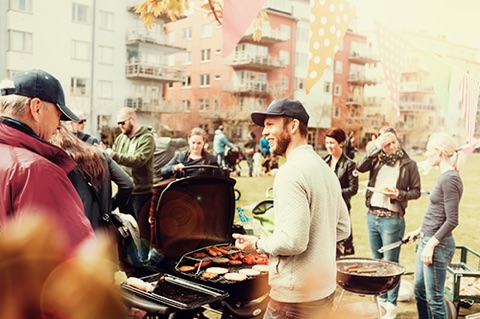LocalLife wants to re-ignite neighbourly spirit
We are talking increasingly about smart cities, but what is actually a smart city and what are its main challenges? KTH Innovation met Hossein Shahrokni, postdoc at KTH and one of the founders of LocalLife.
Smart cities, a rapidly growing phenomenon that we keep hearing about, was how LocalLife got started. The KTH startup is focused on strengthening the local community from a citizens point of view.
– The concept of smart cities is mainly about participating and so called "citizen empowerment". In reality though, most of the smart cities we see today are developed from the top-down perspective, without actually being grounded in the needs of their citizens, says Hossein Shahrokni, co-founder of LocalLife.
Residents in focus

The KTH spin-off is a social network for residents of a community and was founded in 2015 as a result of a collaboration program funded by Vinnova, Smart City SRS. Current smart city solutions work fine on a city and infrastructure level, but are less successful on an individual level as they don't address the particular needs of the citizens.
– Let's look at the smart electricity grid for example. You have always been able to do your laundry whenever it suits you and hardly ever think about your energy consumption, it's just there and it works fine. Suddenly you are expected to adjust to the grid and change your habits. It is understandable that this creates confusion and resistance among residents, says Hossein Shahrokni.
The challenge, therefore, was to identify the real needs of the residents as the basis for finding a solution. The team acknowledged a strong global trend in connection with the digitalisation - we are increasingly globally connected and have more contact with friends, family and collegues regardless of their location than we have with our local community. And this local isolation has led to over 70% of the population not knowing a single one of their neighbours. The engagement and interaction between residents in a local community is something that Hossein Shahrokni considers to be one of the pillars of socitey and something that we have, up until now, taken for granted.
"We don't consider ourselves locally isolated"
– We don't consider ourselves locally isolated but there is so much our neighbours know that we are never going to find on Google, he says.
This became the opening for LocalLife, who wants to put the citizens in focus of the smart city by enabling them to organise themselves, communicate and share information and things with each other. Using their technical solution, LocalLife connects the physical space with the digital space and acts as a secure local infrastructure with verified users on three levels - property/housing society, neighbourhood and local commnity. This infrastructure allows integration of sustainable third party interaction such as energy and sharing economy services.
– We have no intention of making all neighbours best friends, but when residents communicate with each other good things come of it, says Hossein Shahrokni.

How does this kind of communication platform help a community as a whole?
- The local social capital is eroded resulting in great challenges for society as a whole. This is where technology can intervene to enable communication and coordination in a more modern way. We have designed our solution from scratch to strengthen local engagement and will follow up with indicators such as trust, security, identity/pride and environmental awareness. These parameters will be fed back to the residents who can organise themselves to strenghten their community even more. There are many social and environmental sustainability aspects that thrive only in the local community.
How is that?
– Let's use circular economy as an example. There are two strong barriers facing the circular economy: distance and trust. If people in a housing area start to help and communicate with each other on their own terms, they will build trust in each other. If, for instance, I lend my drill to a neighbour and get it back, that increases our trust in each other. That way we are scaling the trust ladder until perhaps we feel confident enough to lend our car or ask if a neighbour might consider babysitting for us. Communication and close proximity builds trust and local social capital. There is also research suggesting that the prouder I am of my local community the better I will look after it.
How did you get in touch with KTH Innovation?
– The project was started as a part of a research project at KTH, and VINNOVA expected the results to make a difference in the marketplace. This was an area I had no knowledge of. We had great support from Donnie SC Lygonis, business coach at KTH Innovation, and what a difference that made! After that we also had fantastic support from Siimon Vaske, also a business coach at KTH Innovaiton and both have been phenomenal in their feedback and guidance.
What support has been crucial?
– Donnie shot down many thoughts and ideas along the way and was not at all shy of reality checking, which was great in the beginning when we were perhaps a little too visionary. Apart from that, the great network has been very useful and Siimon's support in getting investment via KTH Holding AB was fantastic.
What's in the pipeline for LocalLife?
– Since February we are a part of STING and our collaboration with our coach Karin Ruiz continues throughout 2017. Through the STING recruiter Raman Ramalingams we recently hired our CTO, Matheus Bochetti, who comes directly from King with 14 years experience. We continue our pilot work and have started our involvement in Finnboda and plan further pilots in Hammarby Sjöstad, Norra Djurgårdsstaden, Ebbepark and Storsudret. I'm very much looking forward to KTH research into how the social capital is changing over time through a digital service that was built especially for that purpose. Let's just say we have a very interesting learning process ahead of us!
Malin Luuke
Luuke@kth.se

